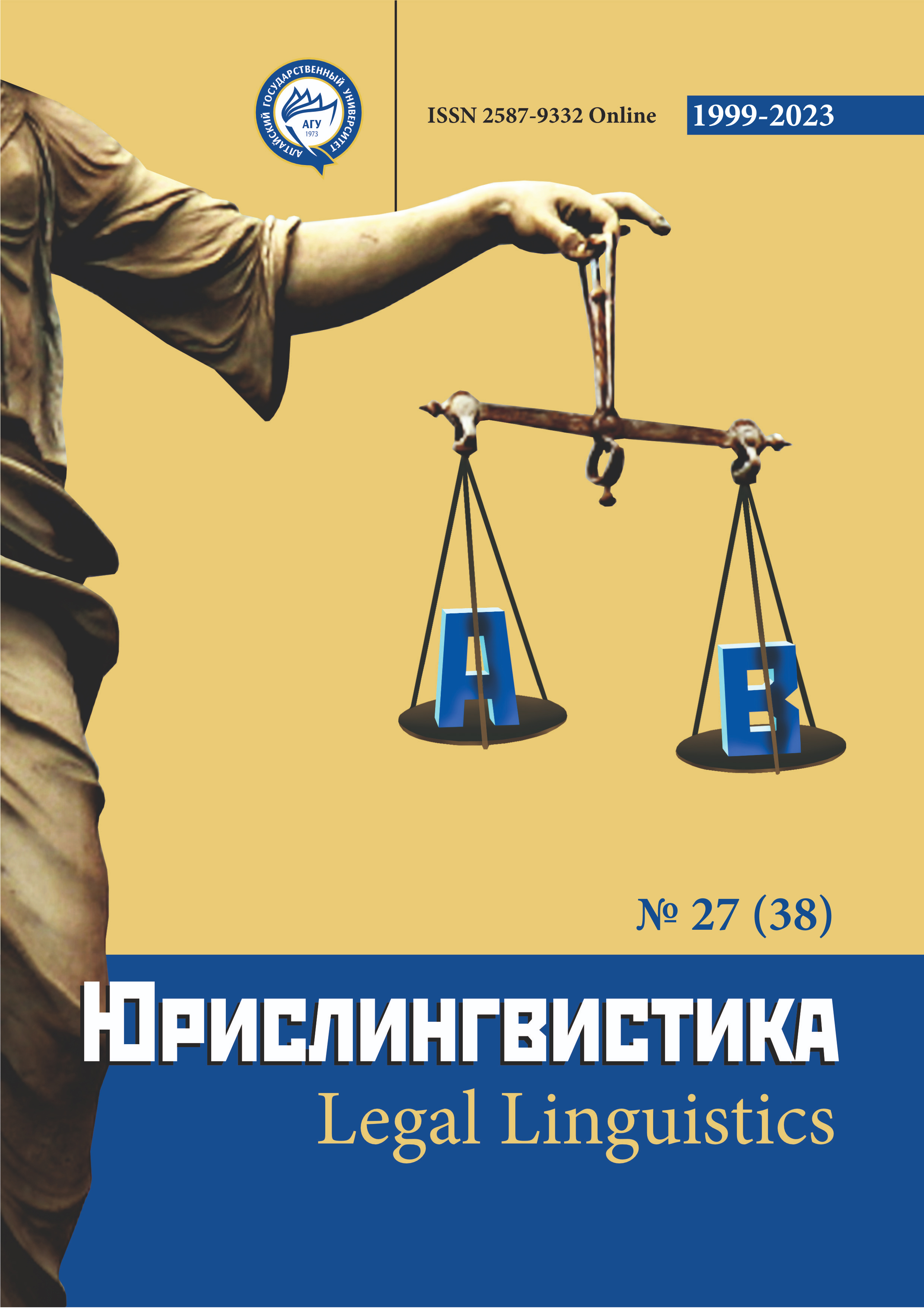Negative Deverbatives in the Texts of the Law: Communicative and Pragmatic Aspect
УДК 81.42 ББК Ш105.5
Abstract
The article concentrates on the study of the peculiarities of the functioning of negative verbal nouns (deverbatives) in legislative texts. In the process of analyzing the current laws of the Russian Federation, it was found that the negative deverbatives used in them have different degrees of substantivisation, and the most common are lexemes ending in -ение, that is, exactly those in which the verbal semantics of the base is clearly manifested. On the contrary, the more strongly a word has been substantivized, the less opportunities it has to attach negation. Weakly substantivized nouns are quite difficult for the recipient to perceive, since they are the result of nominalization of the original predicate, during which the particle does not merge with the base and turns into a prefix, thereby forming a word that is more complex in terms of structure and semantics. In addition, acquiring formal indicators of belonging to a group of nouns, the lexeme continues to express verb meanings that can be actualized in certain contexts. In this paper, three types of contexts are distinguished that actualize the verbal semantics of the deverbative: 1) use in constructions with derived denominal causal or conditional prepositions; 2) the presence of a negative deverbative noun in the creative case with the meaning of the actor; 3) use in constructions with propositional actants. The functioning of the deverbative in the above-mentioned contexts often leads to a contradiction of their substantive and verbal meanings.
Downloads
Metrics
References
Балли Ш. Общая лингвистика и вопросы французского языка. М., 1955.
Батюшкина М.В. К вопросу о выражении в законодательных текстах семантики действия / Юрислингвистика. - 2018. - №9-10. - С. 31-58.
Биньковская М.В. Формирование предлогов со значением условия и уступки в деловом языке второй половины XVIII века (по материалам ОГАЧО) / Вестник Южно-Уральского государственного университета. Серия: Лингвистика. - 2008. - №1(101). – С. 39-41.
Винокур Г.О. Глагол или имя? (Опыт стилистической интерпретации) / Русская речь. - 1928. - № 3. - С. 75-93.
Гун Ц. Особенности функционирования производных причинных предлогов с субстантивным компонентом в связи с и по случаю / Балтийский гуманитарный журнал. - 2017. - №2(19). – С. 33-35.
Лузина Г.Л. Исследования отглагольных имен существительных в русском языке (обзор). / Социальные и гуманитарные науки. Отечественная и зарубежная литература. Сер. 6: Языкознание: Реферативный журнал. - 2001. - №1. – С. 111-123.
Маркова В.А. Предлоги ввиду, вследствие, в результате, в силу в лингводидактическом освещении / Слово. Предложение. Текст: анализ языковой культуры. - 2016. - № 10. - С. 4-13.
Меретукова М.М., Малова Н.Е., Сапиева С.К. Отрицательные частицы русского языка / Актуальные научные исследования в современном мире. - 2021. - № 10-6(78). - С. 130-134.
Пешковский А.М. Методика родного языка, лингвистика, стилистика, поэтика. Л.,1925.
Розенталь Д.Э. Справочник по правописанию и литературной правке / под ред.И.Б. Голуб. М., 2012.
Copyright (c) 2023 Вера Поповская

This work is licensed under a Creative Commons Attribution 4.0 International License.
The authors, which are published in this journal, agree to the following conditions:
1. Authors retain the copyright to the work and transfer to the journal the right of the first publication along with the work, at the same time licensing it under the terms of the Creative Commons Attribution License, which allows others to distribute this work with the obligatory indication of the authorship of this work and a link to the original publication in this journal .
2. The authors retain the right to enter into separate, additional contractual agreements for the non-exclusive distribution of the version of the work published by this journal (for example, to place it in the university depository or to publish it in a book), with reference to the original publication in this journal.
3. Authors are allowed to post their work on the Internet (for example, in a university repository or on their personal website) before and during the review process of this journal, as this may lead to a productive discussion, as well as more links to this published work (See The Effect of Open Access).











